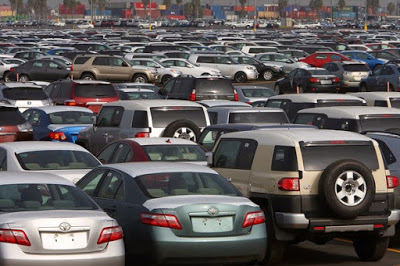
(adsbygoogle = window.adsbygoogle || []).push({});
The Federal Government, through the Nigerian Customs Service, last
week issued a directive banning the importation of cars through
Nigeria’s land borders. The ban affects used and new cars. The order was
clear that this action does not represent a total ban on importation of
cars into the country, but a restriction of car importation to Nigerian
seaports.
The ban has since generated a lot of debate with many condemning the
action, especially those who are up in arms and have accused the
government of being insensitive to the plight of small car dealers who,
it is now becoming clear, are major beneficiaries of cars imported
through the country’s land borders.
action, especially those who are up in arms and have accused the
government of being insensitive to the plight of small car dealers who,
it is now becoming clear, are major beneficiaries of cars imported
through the country’s land borders.
There are also those who have pointed out that the ban, coming at
this time when the country is in recession, represents a further squeeze
on the already tight economic positions that Nigerians are in. Those
who have made this accusation have not, however, shown how the ban adds
to this squeeze, except that they say the prices of imported cars will
rise when they begin to come in through Nigeria’s seaports in January
2017.
this time when the country is in recession, represents a further squeeze
on the already tight economic positions that Nigerians are in. Those
who have made this accusation have not, however, shown how the ban adds
to this squeeze, except that they say the prices of imported cars will
rise when they begin to come in through Nigeria’s seaports in January
2017.
The Government’s argument for the ban, and rightly so, is that the
country is losing money as a result of unpaid duties and taxes because a
vast majority of the cars that comes in through the land borders is
smuggled into the country. Besides this point, it has also been noted
that the land borders are a veritable ground for corruption as smugglers
tend to have their way with border officials who collect bribes and
look the other way while smugglers have a field day.
country is losing money as a result of unpaid duties and taxes because a
vast majority of the cars that comes in through the land borders is
smuggled into the country. Besides this point, it has also been noted
that the land borders are a veritable ground for corruption as smugglers
tend to have their way with border officials who collect bribes and
look the other way while smugglers have a field day.
But there are more overriding economic reasons for the Federal
Government to step in to put a halt to the nefarious activities that
take place at the country’s land borders. For many years, the Nigerian
government, enjoying the cushion provided by lucrative oil prices had
become irresponsible in the management of its broad economic
responsibilities. The fact that oil revenues were ‘walking’ into the
coffers of government and it appeared to be never drying up, made
government complacent, neglecting other sources of generating revenues.
Government to step in to put a halt to the nefarious activities that
take place at the country’s land borders. For many years, the Nigerian
government, enjoying the cushion provided by lucrative oil prices had
become irresponsible in the management of its broad economic
responsibilities. The fact that oil revenues were ‘walking’ into the
coffers of government and it appeared to be never drying up, made
government complacent, neglecting other sources of generating revenues.
(adsbygoogle = window.adsbygoogle || []).push({});
Now, it appears the chicken has come home to roost and government is
now waking up from a deep and long slumber. It must be said, however,
that anytime government attempts to put in place measures such as this,
particularly since it is aimed at making sure it gets car importers to
pay duties and taxes, the opposition is not often because it is doing
so. It is rather government’s failure for many years to justify its
revenue drive by the quality of services it renders to citizens. It is
generally believed that revenue generated ends up in the pockets of
government officials who feed fat at the expense of citizens.
now waking up from a deep and long slumber. It must be said, however,
that anytime government attempts to put in place measures such as this,
particularly since it is aimed at making sure it gets car importers to
pay duties and taxes, the opposition is not often because it is doing
so. It is rather government’s failure for many years to justify its
revenue drive by the quality of services it renders to citizens. It is
generally believed that revenue generated ends up in the pockets of
government officials who feed fat at the expense of citizens.
SHIPS & PORTS DAILY is of the view that
in welcoming the action taken by the government to ban car importation
through the land borders in order to generate revenue and curb
smuggling, government has a responsibility to ensure that it provides
efficient services directly, at the ports to importers, and generally,
to citizens who need to be satisfied that revenues generated will be
used to provide services to Nigerians.
in welcoming the action taken by the government to ban car importation
through the land borders in order to generate revenue and curb
smuggling, government has a responsibility to ensure that it provides
efficient services directly, at the ports to importers, and generally,
to citizens who need to be satisfied that revenues generated will be
used to provide services to Nigerians.
We are also of the view that in putting this ban in place, Government
should have a broad view of this in terms of policy direction, not just
looking at it from the narrow view of revenue generation and control of
smuggling. Apart from taxes and duties, Nigeria has been losing jobs to
neighbouring countries, as well as stagnating in port cargo clearance
technology developments in the decades that it had turned a blind eye to
this matter.
should have a broad view of this in terms of policy direction, not just
looking at it from the narrow view of revenue generation and control of
smuggling. Apart from taxes and duties, Nigeria has been losing jobs to
neighbouring countries, as well as stagnating in port cargo clearance
technology developments in the decades that it had turned a blind eye to
this matter.
It is our view that the Federal Government must now rise to its
responsibility and see the job creating side of this policy and approach
it with an eye to harness all the benefits that it offers. It must also
be accountable as we expect that six months down the road, an account
would be given of how well the policy has been implemented.
responsibility and see the job creating side of this policy and approach
it with an eye to harness all the benefits that it offers. It must also
be accountable as we expect that six months down the road, an account
would be given of how well the policy has been implemented.











